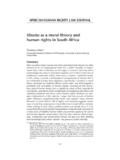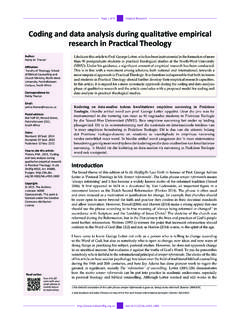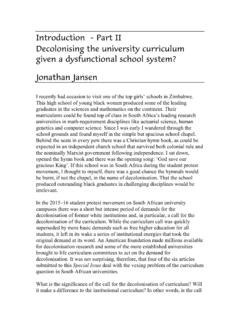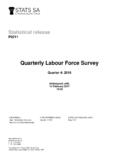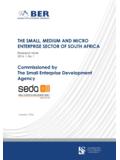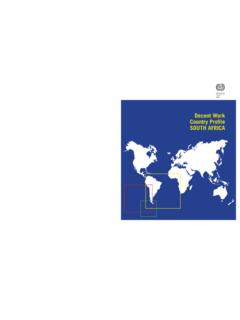Transcription of Youth unemployment in South Africa A theological ...
1 Missionalia 43:3 (513 525) 513 Youth unemployment in South AfricaA theological reflection through the lens of human dignity Anita Cloete1 AbstractThis article pays attention to Youth unemployment as one of the most serious socio-economic challenges in South Africa . The nature of unemployment in South Africa is followed by a discussion on the interconnectedness between unemployment and poverty. The psychological and theological meaning of work is discussed in short, followed by the psychological effect of unemployment . In order to indicate how unemployment undermines human dignity, certain theological themes on human dignity are outlined. The final section explores ways in which the church could assist in affirming human dignity in the context of unemployment . Key words: Youth , unemployment , human dignity, church. unemployment remains the biggest thief of hope amongst young people.
2 21. IntroductionUnemployment is mostly described as an economic issue, but it s argued here that unemployment poses a threat to human dignity and should therefore be a theological focus on Youth unemployment is motivated by the fact that young people are the biggest cohort of new job seekers and are therefore the most vulnerable group with regard to unemployment . Furthermore little research has been done, especially in South Africa , on Youth unemployment from a theological perspective. Unemployed here refers to those who are available for work and are looking for work, but cannot find paid work. The focus is thus not on voluntary unemployment , but rather on in-voluntary unemployment . The article will first explore the problem of unemployment , utilising other discipline like psychology to interpret the effect thereof. The normative focus is through the lens of a theological perspective on human dignity. In light of the severity and the cause and effect of the problem and the normative perspective, certain pragmatic suggestions is made as to how the church could be an agent of speaking out against inhumane conditions and relations and restore and cherish hu-man dignity in the context of unemployment .
3 1 Dr. Anita Cloete is a Senior Lector In the Department Practical Theology & Missiology,Faculty of Theo-logy, at the University of Stellenbosch. She can be contacted at 2 Ramphele, M. Steering by the Stars: Being Young in South Africa . (Cape Town: Tafelberg Publishers 2002) | Missionalia 43:3 514 Anita Cloete2. Youth unemployment in South AfricaLam, Leibrandt and Mlatsheni point out that South Africa is an important case study for Youth unemployment , although research on Youth unemployment in South Af-rica is According to Cochrane and West, Youth and those with lower skill levels are most affected by the unemployment situation in South Africa . Statistics from different studies confirm the challenge of Youth unemployment in South A study by Community Agency for Social Enquiry (CASE) in 2000, more than 12 years ago, indicates that the Youth perceived unemployment as the biggest prob-lem facing Unfortunately the picture did not change as Baker confirms that three-quarters of all unemployed persons in South Africa are younger than 35 years and 65% of the unemployed have never held a According to Stats SA 2012, the unemployment rate for the first quarter of 2010 is (according to the narrow definition) and approximately 37% according to the broad definition.
4 7 The 2014 Stats SA confirms the continuous high unemployment rate of 67, 7% amongst the age group 15-34 ( Youth ). 8 The structural nature of unemployment is pointed as one of the main reasons for the increase in long-term unemployment that rose from 2,6 million in 2008 to 3,4 million in 2014, while the unemployment rate is 25,4% according to the narrow definition, which excludes the discouraged job-seekers. 9 Although there are various reasons for Youth unemployment such as population growth, lack of experience, inappropriate ways of searching for a job, and lack of career guidance in schools, the unemployment rate for first-time job-seekers in South Africa is unacceptably high. Young people are beginning to feel a sense of al-ienation from the larger society and a sense of betrayal by the government, because they realize that their lives have not changed for the better since 1994. A study in the Limpopo province confirms that the majority of young people are concerned that the government is not doing enough to create jobs for them.
5 Although they served as foot soldiers during the apartheid struggle, they have been forgotten now that freedom has been achieved. 10 Youth has been on the forefront of the struggle for 3 Leibbrandt, D. ,& Mlatsheni, C. Education and Youth unemployment in South Africa . Working Pa-pers Series No 22. South African Labour and Development Research Unit, (UCT: Cape Town 2008), 1-2. 4 Cochrane, J. R. & West, G. O. The Three-Fold Cord: Theology, Work and Labour. (Cape Town: Cluster Publication 1991), 34. 5 Youth 2000. A National Study of Youth in South Africa . Barker, F. The South African Labour Market: Theory and Practice. (Pretoria: Van Schaik 2007), Stats SA, 2002. Labour force Survey, February 2002. Pretoria: Statistics South Stats SA 2014. Quarterly Labour Force Survey, Quarter 3. 2014. http:/ , Visited 2015/01/16. 9 Stats SA 2014. 10 Mokgohloa, D., Views and Experiences of Unemployed Youth Graduates: A Case Study of the Polokwa- Youth unemployment in South Africa 515freedom and participated in demonstration on grassroots level in protest against the apartheids regime and many lost their lives in the process.
6 In order to understand the challenge of unemployment better, specifically in South Africa , the nature of unemployment will be discussed in The nature of unemployment in South AfricaUnemployment in South Africa has an indisputable structural or systemic character. Structural unemployment implies the overall inability of an economy to provide em-ployment for the total (or potential) labour force, even at the peak of its economic cycle. Needless to say, due to its nature, structural unemployment is the hardest to address. unemployment is also much higher amongst the poor and is therefore mentioned as one of the four poverty traps inherent in the socio-economic situation since Although the South African economy has grown fast since adopting the neo-liberal economic system, it did not result in generating employment. The adoption of neo-liberal globalism and free-trade policies exposed South Africa to the import of cheap products and the well-intended labour legislation of the ANC government contributed to unemployment in South Africa .
7 He concludes that be-cause of this situation [t]he South African economy today has much more of a third world character than it had in 1994 . 12Du Plessis and Smith explain that employment has fallen due to the relative increase in demand for skilled labour, which imply a decrease in the demand for unskilled labour with the drive to improve its international competitive This is thus in line with the statement made earlier that young people and unskilled people are mostly affected by unemployment . In contrast with the fact that unskilled people struggle to find employment, the unemployment rate amongst educated people (skilled people) is also increasing in South Africa . Mokgohloa emphasises the fact that although poor education is significant contributing factor to unem-ployment, graduate unemployment is also on the increase in our Other characteristics of unemployment is that it is not homogenously spread amongst the different population groups as black and female youths have less access to Education also has a recognised role in unemployment as with poor educa-ne area, Limpopo Province South Africa .
8 (M Phil thesis: Stellenbosch University 2006), 38. 11 Terreblance, S. A History of Inequality in South Africa 1652-2002. (Pietermaritzburg: University of Natal Press 2005), 372-374. 12 Terreblance. S, Lost in Transformation: South Africa search for a new future since 1986. (Sandton: KMM Review Publishing Company 2012), 107. 13 Duplesis, S, Smith, B, South Africa s Growth Revival After 1994. Journal of African Economies 16. no 5 (2007), Mokgohloa, Graduate unemployment , 15. 15 Mlatsheni, C, Rospab , S, Why Youth unemployment is high and unequally spread in South Africa ? Missionalia 43:3 516 Anita Cloetetion it is difficult and even impossible to find thus reflects other social challenges like racial and sexual inequalities in our country and could also be linked to poverty. The relationship between unemployment and poverty as well as the possible cause and effects of poverty on people will be the focus of the following section.
9 4. unemployment and povertyThe link between unemployment and poverty is described by Fourie as bi-direc-tional causality since unemployment causes poverty and poverty contributes to unemployment and its The perceptive that poverty persists not only because of a scarcity of resources, because some societies have inefficient eco-nomic systems, or lack of natural resources, or because poor people lack ambition is relevant for this Poverty is a product of human social relationships. According to this perspective the social aspects of relationships set the structure of economic exchange. The way people assign and distribute things of value, depends both on how integrated and segregated their relationships are and how powerful they are in relation to one another. There is also a certain stigmatisation attached to, stereotyping of and prejudice towards poor people because poverty is associ-ated with such problems as lack of hygiene, illness, disease and lack of education, and so on.
10 These prejudices lead to distance between the poor and the rich and this distance keeps the distorted relationships with their unequal distributions of resources and power intact. Poverty is thus much more than a lack of access to resources to meet basic needs. Poverty is also a symptom of power inequalities. In this kind of relationship the powerful have the freedom to engage with or to exclude. Poverty is not only about a lack of access to basic services, but of being excluded from the interac-tion, decision-making process and, most of all, the exchange of goods in economic processes. Therefore the plight of the poor is best understood on their own terms. Poverty inflicts physical, psychological and spiritual pain in people of all ages who strive for wellness and resist the oppressive burden of destitution. In the discus-sion of the effect of unemployment it will become clear that unemployment influ-ences not only the personal well-being of the individual, but also the wellness of Working Papers.


